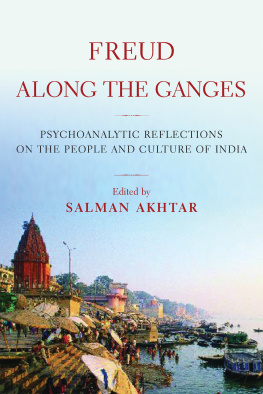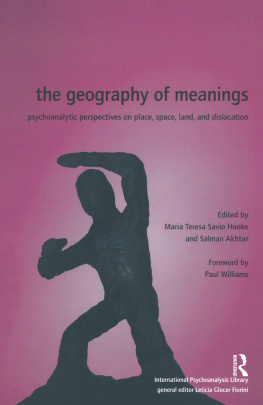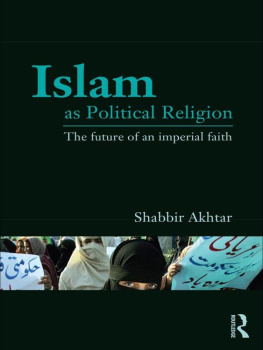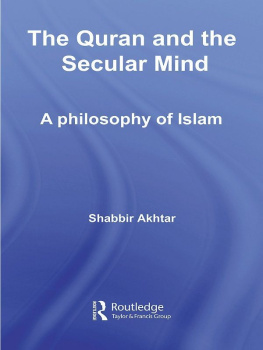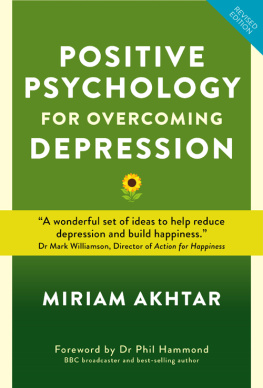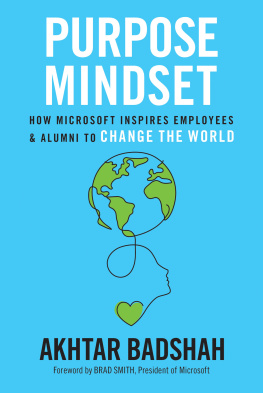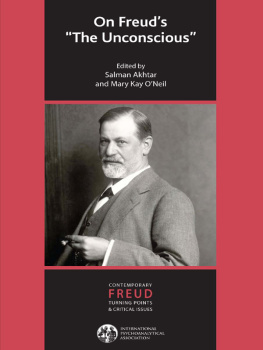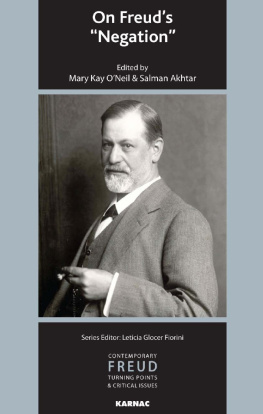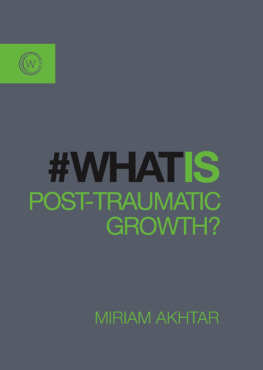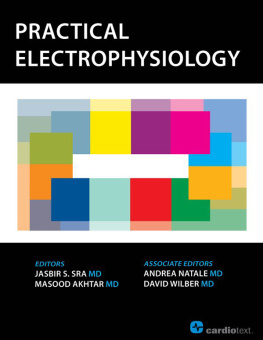Salman Akhtar - Freud Along the Ganges
Here you can read online Salman Akhtar - Freud Along the Ganges full text of the book (entire story) in english for free. Download pdf and epub, get meaning, cover and reviews about this ebook. year: 2020, publisher: Other Press, genre: Politics. Description of the work, (preface) as well as reviews are available. Best literature library LitArk.com created for fans of good reading and offers a wide selection of genres:
Romance novel
Science fiction
Adventure
Detective
Science
History
Home and family
Prose
Art
Politics
Computer
Non-fiction
Religion
Business
Children
Humor
Choose a favorite category and find really read worthwhile books. Enjoy immersion in the world of imagination, feel the emotions of the characters or learn something new for yourself, make an fascinating discovery.
- Book:Freud Along the Ganges
- Author:
- Publisher:Other Press
- Genre:
- Year:2020
- Rating:5 / 5
- Favourites:Add to favourites
- Your mark:
- 100
- 1
- 2
- 3
- 4
- 5
Freud Along the Ganges: summary, description and annotation
We offer to read an annotation, description, summary or preface (depends on what the author of the book "Freud Along the Ganges" wrote himself). If you haven't found the necessary information about the book — write in the comments, we will try to find it.
Freud Along the Ganges — read online for free the complete book (whole text) full work
Below is the text of the book, divided by pages. System saving the place of the last page read, allows you to conveniently read the book "Freud Along the Ganges" online for free, without having to search again every time where you left off. Put a bookmark, and you can go to the page where you finished reading at any time.
Font size:
Interval:
Bookmark:
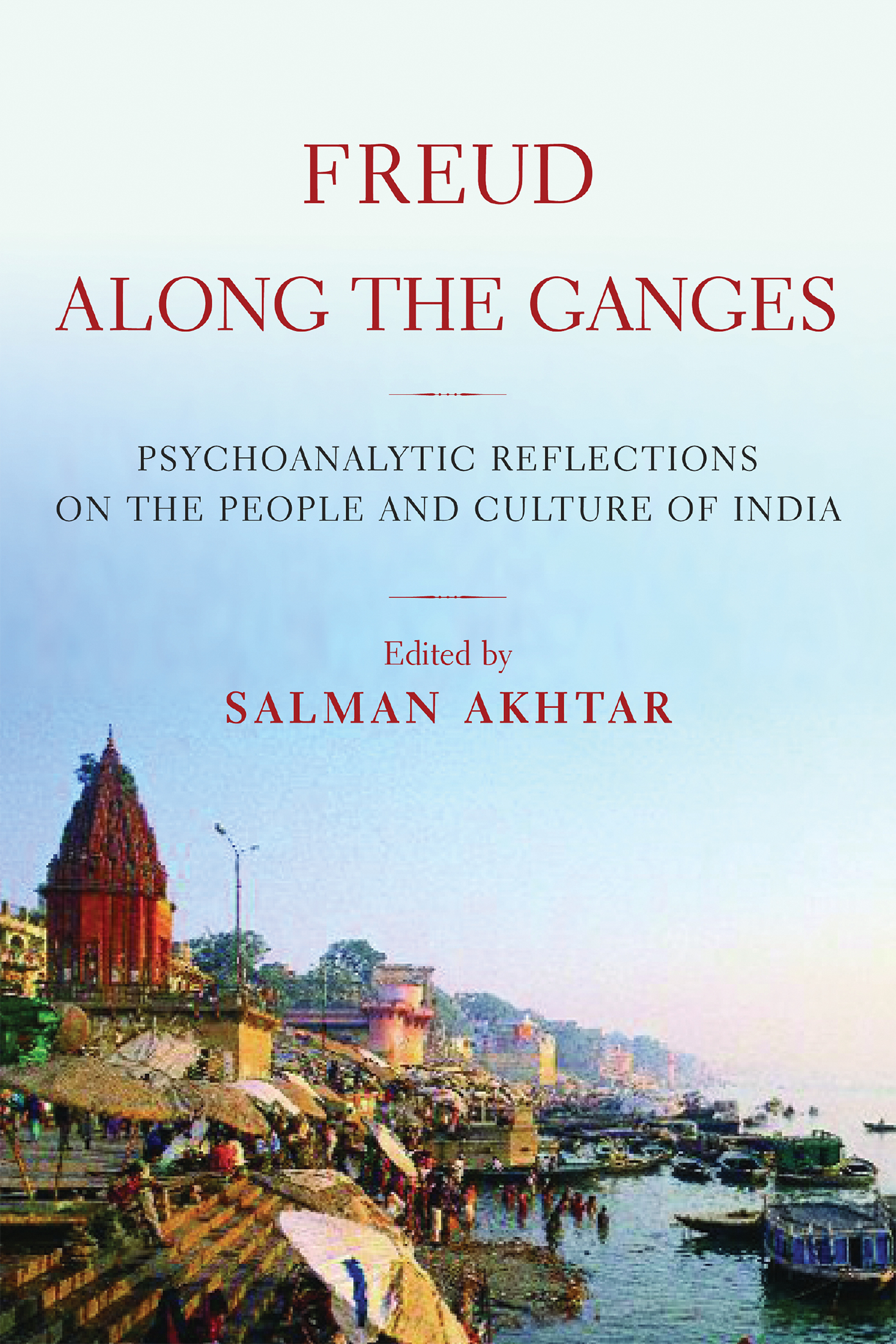
To
my first mentor in psychiatry
PROFESSOR NARENDRA NATH WIG
with affection and gratitude
B OOKS BY S ALMAN A KHTAR
Psychiatry and Psychoanalysis
Broken Structures (1992)
Quest for Answers (1995)
Inner Torment (1999)
Immigration and Identity (1999)
New Clinical Realms (2003)
The Alphabet of Psychoanalysis (in press)
Popular/Non-Fiction
Objects of Our Desire (2005)
Urdu Poetry
Ku-ba-ku (1976)
Doosra Ghar (1986)
Nadi Ke Pas (2004)
English Poetry
The Hidden Knot (1985)
Conditions (1993)
Turned to Light (1998)
Edited
New Psychiatric Syndromes (1983)
The Trauma of Transgression (1991)
Beyond the Symbiotic Orbit (1991)
When the Body Speaks (1992)
Mahler and Kohut (1994)
The Birth of Hatred (1995)
The Internal Mother (1995)
Intimacy and Infidelity (1996)
The Seasons of Life (1997)
The Seed of Madness (1997)
The Colors of Childhood (1998)
Brothers and Sisters (1999)
Thicker than Blood (2000)
Does God Help? (2001)
Three Faces of Mourning (2001)
Real and Imaginary Fathers (2004)
Mental Zoo (2005)
Cultural Zoo (2005)
The Language of Emotions (2005)
Freud Along the Ganges (2005)
Severe Personality Disorders (in press)
The Crescent and the Couch (in press)
Interpersonal Boundaries (in press)
Space and Intuition (in press)
I wish to thank the distinguished colleagues whose contributions appear in this volume. I am also thankful to Michael Vergare, M.D., who, as the chairman of the Department of Psychiatry and Human Behavior at Thomas Jefferson Medical College, gave unwavering support to my work. A number of psychoanalytic colleagues, especially Drs. Ira Brenner, Saida Koita, and Vamik Volkan, gave me useful advice during the preparation of this book. Many others, including Drs. Subhash Bhatia, Shiv Kumar Hatti, Naresh Julka, Rajnish Mago, Shantanu Maitra, Harish Malhotra, Ashwin Patkar, Tarnjit Saini, and J. Anderson Thomson, as well as Bharat Luthra, Nawab Warsi, Manail Ahmad, Shivani Nath, and Shankar Vedantam, helped in subtle and explicit ways. I also received helpful input from my uncle and aunt, Abu and Hamida Salim, who are distinguished academics in their own right, on certain aspects of this book. Anju Bhargava made some very important points for me to consider and greatly enriched the book. My secretary, Melissa Nevin, offered me devoted and skillful assistance. Going-on-being (to use a phrase of Donald Winnicott) pleasantly, despite my occasionally infantile demands, she made my work easier. To all these individuals, I offer my sincere thanks.
Above all, though, is my gratitude to India, my motherland. The milk of its generosity flows as the blood of industry in my veins. For all my effort in preparing this book on India, there are no more apt words than those of Kahlil Gibran: Work is love made visible.
Salman Akhtar, M.D. Professor of Psychiatry, Jefferson Medical College; Training and Supervising Analyst, Psychoanalytic Center of Philadelphia, Philadelphia, Pennsylvania.
Santanu Biswas, Ph.D. Professor of English Literature, Jadhavpur University, Calcutta, West Bengal, India.
Komal Choksi, M.A., M.Phil. Doctoral student at the Clinical Psychology Sub-Program of the Graduate Center of the City University of New York, New York, New York.
Prakash N. Desai, M.D. Professor of Psychiatry, University of Illinois at Chicago; Co-Chief of Staff, Jesse Brown Medical Center, Chicago, Illinois.
Jaswant Guzder, M.D. Associate Professor of Psychiatry, Faculty of Medicine, McGill University, Montreal; Faculty Member, Canadian Psychoanalytic Institute, Montreal, Canada.
Sudhir Kakar, Ph.D. Training and Supervising Analyst, Indian Psychoanalytic Society, Goa, India.
Meenakshi Krishna, M.A. Freelance business consultant, London, England.
Hyman L. Muslin, M.D. Professor of Psychiatry, University of Illinois at Chicago, Chicago, Illinois (deceased).
Prajna Paramita Prasher, Ph.D. Faculty Member, Department of Film Studies, Chatham College, Pittsburgh, Pennsylvania.
Dwarakanath G. Rao, M.D. Adjunct Clinical Assistant Professor of Psychiatry, University of Michigan Medical School; Training and Supervising Analyst, Michigan Psychoanalytic Institute, Ann Arbor, Michigan.
Satish Reddy, M.D. Assistant Professor of Clinical Psychiatry and Medicine, Faculty Member, Columbia University Center for Psychoanalytic Training and Research, New York, New York.
Alan Roland, Ph.D. Training Analyst and Faculty Member, National Psychological Association of Psychoanalysis, New York, New York.
John Munder Ross, Ph.D. Training and Supervising Analyst, Columbia University Center for Psychoanalytic Training and Research, New York, New York.
Jeffrey B. Rubin, Ph.D. Private practice of psychoanalysis and psychotherapy, New York, New York.
Bhaskar Sripada, M.D. Clinical Associate Professor of Psychiatry, University of Illinois at Chicago; Faculty Member, Institute of Psychoanalysis, Chicago, Illinois.
Pratyusha Tummala-Narra, Ph.D. Teaching Associate, Department of Psychiatry, Cambridge Hospital/Harvard Medical School; Assistant Professor of Clinical Psychiatry, Georgetown University School of Medicine, Washington, DC.
Madhusudana Rao Vallabhaneni, M.D., FRCPC Lecturer in Psychiatry, Faculty of Medicine, University of Toronto; Faculty Member, Toronto Institute of Psychoanalysis, Toronto, Canada.
India has forever fascinated Western observers and yet its essence has always eluded them. Shades of gray have never appeared in their portrait of India. The country has either evoked a shudder at its poverty and overpopulation or elicited rosy idealization of its monuments and ancient civilization. The former stance, emanating from pitiful scorn, is evident in the biased coverage of India in the Western news media. Stories of malnourished children, bride burning, train accidents, caste tensions, people marrying animals in esoteric rural customs, and all varieties of superstitious surrender of logic abound in their presentation of India. The latter tendency, namely that of idealization, offers an equally unrealistic picture. India is seen as a land of omnipresent divinity, serene rivers, placid people, awe-inspiring palaces, and temples for spiritual rejuvenation. Regardless of whether the Western view is disdainful and devaluing or charmed and idealizing, the portrayal of India ends up being a caricature.
The fact is that India is the largest secular democracy of the world. It is a nation with a nuclear capability, booming economy, and a burgeoning middle class that is educated, electronically up to date, and robust in ambition. Its cities are teeming with energy and its citizens are proud of their country. Its rural areas, where a majority of the countrys population lives, are coming out of their backward status. Primitive farming equipment is being increasingly replaced by modern machines for land cultivation. The literacy rate is rising throughout the country and so is the average life expectancy, which has gone from 38.7 years in 1950 to 62.9 years in 1998, the last year for which such data are available. To be sure, social and economic problems continue to exist. Some, such as overpopulation, are old. Others, such as the rise of Hindu fundamentalism, are new. And yet, the secular and democratic spirit of the nation shines through. Voter participation in regional and national elections is high, and the public debates over political and economic matters are informed and passionate.
Font size:
Interval:
Bookmark:
Similar books «Freud Along the Ganges»
Look at similar books to Freud Along the Ganges. We have selected literature similar in name and meaning in the hope of providing readers with more options to find new, interesting, not yet read works.
Discussion, reviews of the book Freud Along the Ganges and just readers' own opinions. Leave your comments, write what you think about the work, its meaning or the main characters. Specify what exactly you liked and what you didn't like, and why you think so.

